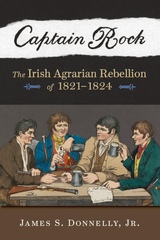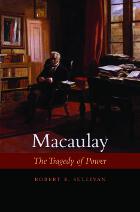
Originating in west Limerick, the Rockite movement spread quickly under the impact of a prolonged economic depression. Before long the insurgency embraced many of the better-off farmers. The intensity of the Rockites’ grievances, the frequency of their resort to sensational violence, and their appeal on such key issues as rents and tithes presented a nightmarish challenge to Dublin Castle—prompting in turn a major reorganization of the police, a purging of the local magistracy, the introduction of large military reinforcements, and a determined campaign of judicial repression. A great upsurge in sectarianism and millenarianism, Donnelly shows, added fuel to the conflagration. Inspired by prophecies of doom for the Anglo-Irish Protestants who ruled the country, the overwhelmingly Catholic Rockites strove to hasten the demise of the landed elite they viewed as oppressors.
Drawing on a wealth of sources—including reports from policemen, military officers, magistrates, and landowners as well as from newspapers, pamphlets, parliamentary inquiries, depositions, rebel proclamations, and threatening missives sent by Rockites to their enemies—Captain Rock offers a detailed anatomy of a dangerous, widespread insurgency whose distinctive political contours will force historians to expand their notions of how agrarian militancy influenced Irish nationalism in the years before the Great Famine of 1845–51.

Less cynical than Talleyrand, more imaginative than Metternich, as creative as Guizot, Lord Liverpool was one of the great European conservatives of his age. He served as prime minister for the longest continuous term in nineteenth-century Britain and presided over the triumphant years of the Napoleonic War, the strife-torn era of the “Peterloo” massacre, and the founding of the great liberal free-trade revolution in financial and commercial policy that heralded Victorianism.
Norman Gash’s biography is the first modern reassessment of this misunderstood statesman. Gash places Liverpool within the kaleidoscopic parliamentary politics of the time and shows how he governed with the collective strength and unity of the cabinet. By offering parsimonious administration and enlightened economic policy, Liverpool hoped to preserve the old constitution and prevent both Catholic emancipation and parliamentary reform. Balancing interests and preserving order, Liverpool also contended with the vicissitudes of the still powerful monarchs—the aging and disturbed George III and the capricious and self-indulgent George IV, whose attempted divorce almost toppled the Liverpool administration.
This is not only an account of one of the most professional prime ministers of Great Britain, but also the story of the personal relations that shaped Lord Liverpool and the private life that gave him immense satisfaction. Based on correspondence and Lord Liverpool’s private papers, Gash’s work recasts the history of a turbulent age and its most prominent political figure.

On the 150th anniversary of the death of the English historian and politician Thomas Babington Macaulay, Robert Sullivan offers a portrait of a Victorian life that probes the cost of power, the practice of empire, and the impact of ideas.
His Macaulay is a Janus-faced master of the universe: a prominent spokesman for abolishing slavery in the British Empire who cared little for the cause, a forceful advocate for reforming Whig politics but a Machiavellian realist, a soaring parliamentary orator who avoided debate, a self-declared Christian, yet a skeptic and a secularizer of English history and culture, and a stern public moralist who was in love with his two youngest sisters.
Perhaps best known in the West for his classic History of England, Macaulay left his most permanent mark on South Asia, where his penal code remains the law. His father ensured that ancient Greek and Latin literature shaped Macaulay’s mind, but he crippled his heir emotionally. Self-defense taught Macaulay that power, calculation, and duplicity rule politics and human relations. In Macaulay’s writings, Sullivan unearths a sinister vision of progress that prophesied twentieth-century genocide. That the reverent portrait fashioned by Macaulay’s distinguished extended family eclipsed his insistent rhetoric about race, subjugation, and civilizing slaughter testifies to the grip of moral obliviousness.
Devoting his huge talents to gaining power—above all for England and its empire—made Macaulay’s life a tragedy. Sullivan offers an unsurpassed study of an afflicted genius and a thoughtful meditation on the modern ethics of power.
READERS
Browse our collection.
PUBLISHERS
See BiblioVault's publisher services.
STUDENT SERVICES
Files for college accessibility offices.
UChicago Accessibility Resources
home | accessibility | search | about | contact us
BiblioVault ® 2001 - 2024
The University of Chicago Press









